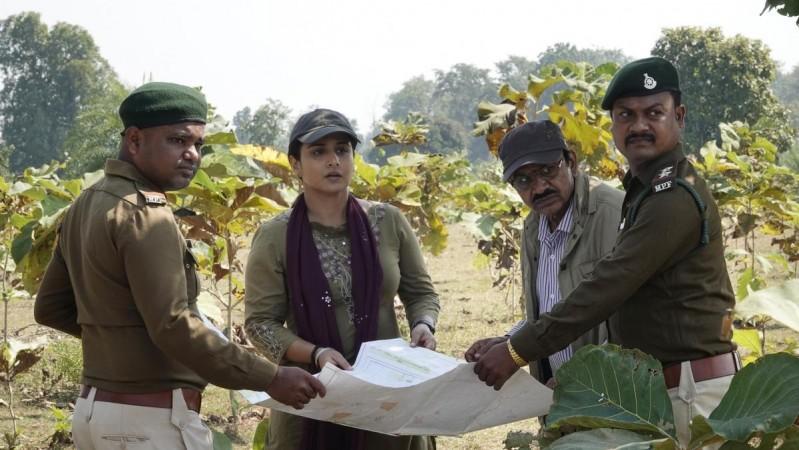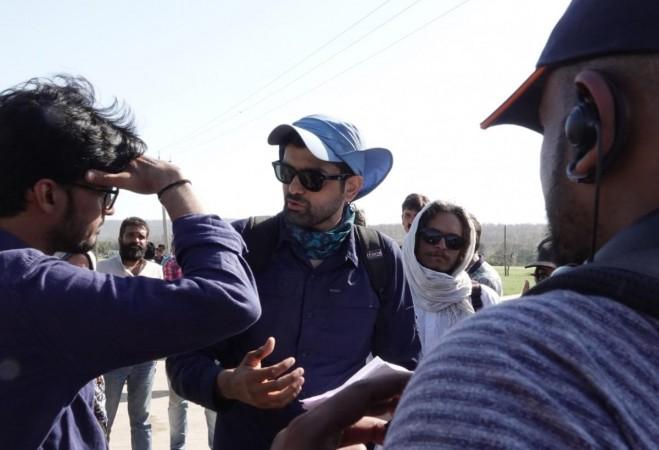Somewhere in between the film, Divisional Forest Officer Vidya Vincent (Vidya Balan) and Zoology professor Hassan Noorani (Vijay Raaz) have a moment of relief when they realize that T12, the tigress on everyone's radar may head from the forest towards the national park on her own, without human intervention, but then, they realize that she cannot get there due to a massive copper mining site in between.
Around the end of the film, a defeated Vincent with her resignation letter in hand can be sighted near the mining site staring at the deep cavities of man's foul play with nature. In another incident in the film, villagers living around the forest are forced to go into the forest to graze their cattle, thereby becoming victims of the tiger's wrath because the land where they would take the cattle earlier has been eaten up by a mindless tree plantation drive.

National award-winning director Amit Masurkar's recent film Sherni, released on Amazon Prime on June 18, is a lesson in ecological imbalance created by man for political, industrial, and economic gains and in the process delves into significant and interconnected aspects of gender and environment, tiger conservation and perils of patriarchal systems.
Starring Vidya Balan, Neeraj Kabi, Brijendra Kalra, Sharat Saxena, the film has been receiving a thought-provoking response from its audiences across the globe.
In conversation with International Business Times, director Amit Masurkar and debutant writer of the film Aastha Tiku take us through the film's journey, its diverse ensemble cast, surviving the pandemic with zero cases on sets, and its intense message to audiences across 240 countries.
1. Sherni narrates the story and struggles of a lady forest officer in a remote setup working on wildlife conservation, was the character inspired by a particular officer's life?

Aastha - The idea of gender and environment is a very interesting theme to explore because if you look at the history of conservation efforts in India, it's a very female-led space, for example, the Chipko movement. Sherni is not the story of one woman but all the women coming from different walks of life, contributing to the efforts in conservation. The subplot of the film might be how women face patriarchy in their workplace but the main idea is that everybody needs to look at conservation as a combined effort. It's only when men, women, children, young people start having a conversation about conservation, that's when things start moving ahead.
Amit - For research, we spoke to many forest guards, forest officials and adopted a multi-modal approach. A lot of matter for the film's story came out from observation, interviews, speaking to experts. They weren't very comfortable with giving out names.
2. The film set in Madhya Pradesh comes at a time when the region is in news for its controversial diamond mining project and felling of more than 2 lakh trees. Your film touches upon mining concerns in the state which boasts of India's largest green cover.
Amit - The idea was to focus on the topic of conservation at large because we are catering to a global audience. We chose Madhya Pradesh because it's a very shoot-friendly place, forest department was extremely helpful.
Aastha - We had an ethnographic sort of approach to this. We wanted to highlight the core dependence of humans on the forest area and how forests are maintained by the humans that live around them. We also wanted to say that people for so long have been living in harmony with nature, what creates these obstructions are reasons that are industrial. Whether you are talking about Brazil and the Amazonia forest, or the Sunderbans; these clusters of problems emerge and often are interconnected.

3. Everyone in the film seems like a part of the story almost like they are playing themselves than a character. Masurkar's first film Newton, also set up in rural India featured a similar characteristic and eventually adds to the real-quo of the narrative.
Amit - The credit goes to our casting team Romal and Tejas who worked with me on Newton too. A lot of actors were from Jabalpur, Champa Mandal who played Jyothi is from the National School of Drama. Most of the people you see in the film, apart from the lead actors who are from Mumbai, are people from the villages or actual forest guards, forest department staff from the Balaghat region of the state. It was important that all actors look like a part of the film. We managed to achieve that despite having actors who are mainstream Bollywood, theatre-artistes, first-time actors–it was a lot of effort for everybody to come to each other's level and ensure they look like a part and no one is stuck out. Also, credit goes to the editor Deepika Kalra who ensured everybody shares similar energy and coherence on screen. It was also important to have a cinematographer who is on the same page and loves nature and understands it, who is sensitive to shooting with non-actors and adjusts accordingly.
4. Did the pandemic affect the filming journey? What were the insecurities in terms of working outdoors during Covid-19?
Amit - Our script was ready by December 2019. In March 2020, we shot the first schedule for 14 days and then didn't shoot for eight months. We were very sensitive and careful about covid and had a strict protocol. We had our own bio-bubble and ensured that all production staff wears PPEs and masks to protect the actors indoors. Outdoor, we kept a very small unit. We stayed in a hotel where no one else was booked. Ours was probably the only film set where there were zero covid cases during the pandemic.
5. Are you always on the lookout for films with a strong message, first democracy and now, conservation?
Amit - I like to focus on things that are new to me because that process teaches me something fresh. If I had to make a film on something too familiar, that would get me disinterested unless it's a fresh take on the subject. In Newton and Sherni, maybe the jungle setting is common and the protagonist setting is common but the themes are very different. Newton was about democracy and it could have been set in North-East, Kashmir or Lakshadweep but it would have told a similar graph of obstacles. Sherni was a completely different idea about conservation and cooperation. It had a very strong female perspective; the style of shooting was different.
6. How's the response to the film so far? Usually, a film with a serious message isn't considered for the masses and only a select few who have an interest in the subject go back with takeaways.
Aastha - With the OTT platform, our film has been able to reach places where there aren't any theatres also. It's a plus for us. Our film has reached 240 countries.
Amit - It's a wrong notion that masses don't care for environmental issues. We are getting messages from people from rural India, thanking us for telling their story. This is their everyday life and they feel their story is never told in mainstream Bollywood.
[Amit and Aastha's next is likely to be a web series for an OTT platform set in urban India and work on it is likely to begin soon.]


!['Had denied Housefull franchise as they wanted me to wear a bikini': Tia Bajpai on turning down bold scripts [Exclusive] 'Had denied Housefull franchise as they wanted me to wear a bikini': Tia Bajpai on turning down bold scripts [Exclusive]](https://data1.ibtimes.co.in/en/full/806605/had-denied-housefull-franchise-they-wanted-me-wear-bikini-tia-bajpai-turning-down-bold.png?w=220&h=135&l=50&t=40)











!['Had denied Housefull franchise as they wanted me to wear a bikini': Tia Bajpai on turning down bold scripts [Exclusive]](https://data1.ibtimes.co.in/en/full/806605/had-denied-housefull-franchise-they-wanted-me-wear-bikini-tia-bajpai-turning-down-bold.png?w=220&h=135)


![Nayanthara and Dhanush ignore each other as they attend wedding amid feud over Nayanthara's Netflix documentary row [Watch]](https://data1.ibtimes.co.in/en/full/806599/nayanthara-dhanush-ignore-each-other-they-attend-wedding-amid-feud-over-nayantharas-netflix.jpg?w=220&h=135)